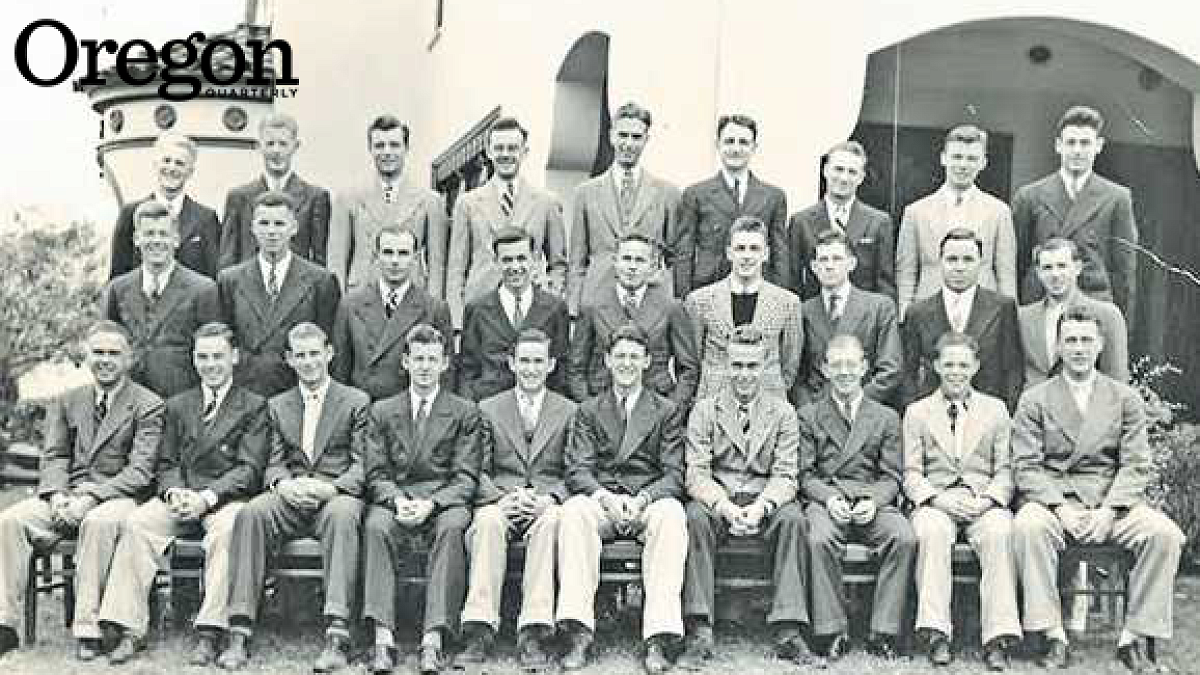In early 1936, as a senior at Roosevelt High in north Portland, I was offered a University of Oregon scholarship of $33 a term, for a total of $66. A lot of money in the Great Depression.
The UO was great! I soon learned how and why to live as a college boy. Football, dances, girls. To mention football is to tell a war story. In the fall of 1936, the UO and the Oregon State Beavers played their annual game in Corvallis. The Beavers won, thereby giving forth a real storm on the UO campus. About 11:30 a.m. on the following Monday, I was sitting in a Shakespeare class when the phone in the classroom rang. The professor answered, turned to the class, and said, “If I was a red-blooded Duck, I wouldn’t stay in this classroom another five minutes. I was just told that those Beavers have formed a 1,500-car safari and are about to enter Eugene to gloat about their victory. Class is over.”
We quickly ran from the classroom, and in short order the campus was filled with students. We had filled water balloons and started bombarding the invaders upon their arrival. They were laughing at first, but fights soon broke out. Then, gallons of green paint appeared in the hands of the Ducks. We began gathering the Beavers and transported them in our cars to Skinner Butte. There we dunked their bottoms in the paint and slid them down the big “O”—the same “O” that is still there. It was just plain hell for the Beavs.
The next few years gave me some idea of how people lived on the other side of the economic fence: with automobiles, vacations, and new clothes. What a wonder this new world was for me, the son of a Hungarian immigrant. One of the great pleasures was being a member of Alpha Tau Omega. I learned camaraderie, but also true and lifelong friendship. It didn’t bother me that one night, while I was asleep on the second-floor sleeping porch, my fraternity brothers seized me, tied me to a mattress, carried it to a nearby sorority house, and dumped me on the front porch. Just plain college fun.
In 1939, I took a year off to work. My job was at Timberline Lodge, as one of the first ski-lift operators. Many years later, in 2000, a new lift was named after me—“Stormin’ Norman.”
On returning to the UO in 1940, a frightening danger was in the news. Germany had invaded Poland, and World War II was on the horizon. I was not in a reserve unit as were many of my classmates, but when the bombing at Pearl Harbor occurred, everyone my age realized that sooner or later we all would be in the service of our country. My draft number was called in February 1942, while I was in my second year of law school. I spent my next four years in the US Army, working as an agent in the Army Counter Intelligence Corps.
I returned to the UO in the fall of 1946 to complete my last year in law school, bringing with me my wife (Mary Bentley Wiener, BA ’44) and child. The school made available 10-by-12-foot wartime trailers that had no indoor toilet facilities. A bed could be positioned at one end of the trailer. The rest of the furnishings consisted of a small table with two chairs, a small sink with no running water, two burners to cook on, and a small couch. The abundance of rain made conversation difficult inside the trailer, and a traffic jam occurred every morning when everyone walked the muddy wooden planks to the community shower and bathroom facilities. It was pure heaven when we upgraded to a one-bedroom apartment.
After graduation, I was hired by a Portland law firm, King & Wood. I became a partner in that firm (now known as Miller Nash) in 1952. During the Korean War, I was recalled to active duty, serving as an officer from January 1951 to April 1952. I then returned to my law firm—and I am still there.
I have maintained a close relationship with the UO for more than 75 years. I was a trustee of the University of Oregon Foundation from 1985 to 1995, and I continue on as a donor. At the 2002 law school graduation ceremony, Dean Strickland awarded me the Meritorious Service Award. Now—in my 96th year—I am mighty proud of that memory and of being a Duck!
—By Norman J. Wiener, BS '41, JD '47


